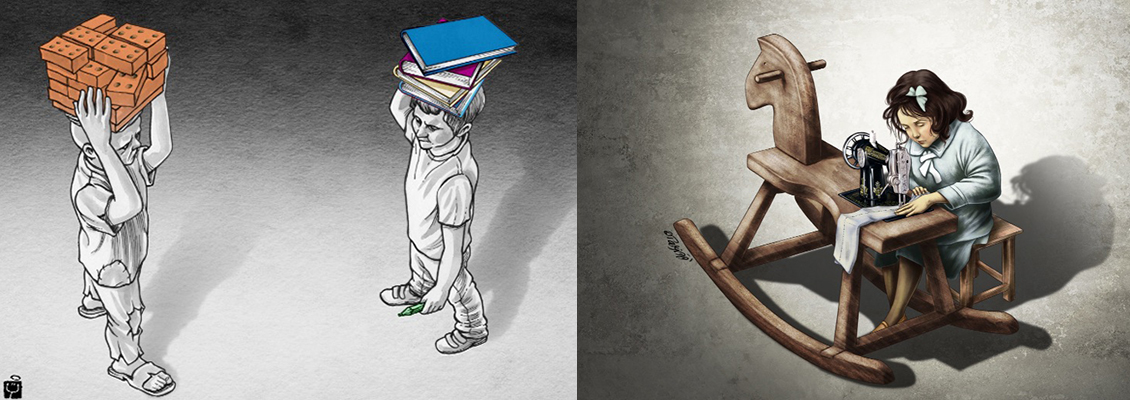By Elizabeth Tower and Phillip Weiss
International Day for the Abolition of Slavery is marked each year on 2 December. Modern slavery is a term used to cover a range of exploitative practices including forced labour, wage exploitation, debt bondage and human trafficking. The International Labour Organisation (ILO) estimated that more than 40 million people globally experience modern slavery daily, including 24.9 million people trapped in forced labour. Alarmingly, one in four victims of modern slavery were children, with women and girls disproportionately affected by forced labour.
The focus of International Day for the Abolition of Slavery is on eradicating contemporary forms of slavery, such as forced labour and forced marriage. From t-shirts to mobile phones, many Australians would be shocked to know that products we buy every day may have been made by people subjected to modern slavery.
“Forced labour is a complex subject,” said Philippe Vanhuynegem, Chief of the Fundamental Principles and Rights at Work Branch at the ILO. “Some stereotyped images, such as chains and balls, are often used to represent modern slavery. However, nowadays, the mechanisms through which a person can be coerced into work can be much more subtle; through deception, passport confiscation, withholding of wages or manipulation of debt.”
Australia & Modern Slavery
- There are at least 1,500-1,900 victims of modern slavery in Australia today.
- Currently, only 1 in 5 victims is ever detected.
The Australian Modern Slavery Act 2018 (the Act) is the world’s first national legislation to define modern slavery. Modern slavery is defined as eight types of serious exploitation:
- trafficking in persons
- slavery
- servitude
- forced marriage
- forced labour
- debt bondage
- deceptive recruiting for labour or services, and
- the worst forms of child labour (for example, situations where children are subjected to slavery or similar practices, or practices or engaged in hazardous work).
The Act contains reporting requirements that apply to commercial and not-for-profit entities with annual consolidated revenue of at least AU$100 million. Currently there are approximately 5,000 reporting entities including large commercial firms but also many universities and hospitals.
Modern slavery can occur in every industry and sector and is also often linked to other crimes and activities that adversely impact human rights, for example, corruption and environmental damage.
The Commonwealth Government has a guide that includes a modern slavery questionnaire that could be included in market invitations to risk assess potential suppliers.
The Victorian government Supplier Code of Conduct now specifically references Modern Slavery. It requires government suppliers to comply with modern slavery laws and states that suppliers must not directly or indirectly engage in exploitative activities. The Code also requires suppliers to “proactively identify, address and – where required by legislation – report on risks of modern slavery practices (defined broadly to include all forms of human trafficking, forced labour and slavery-like practices) in their business operations and supply chains.”
To address risks that in the Textile Clothing and Footwear sector is high risk in relation to ethical labour, modern slavery, and environmental practices, the Victorian Government established the Ethical Supplier Register. When buying locally manufactured uniforms and PPE, Victorian government departments and agencies must procure from suppliers registered on the Ethical Supplier Register.
To ensure that money the public sector spends does not inadvertently support modern slavery, Victorian government agencies can take action to identify and reduce the risks of modern slavery in their supply chains including:
- seeking additional information from and communicating their expectations to tenderers throughout the procurement process (including during specification development, evaluation, interview, etc) and during contract management
- considering, identifying and managing risks in new procurements
- assessing existing contracts for risks of modern slavery
- asking suppliers about abnormally low pricing
- questioning suppliers on what measures they have in place to identify and combat modern slavery in their supply chains
- taking action when modern slavery practices are identified
- raising awareness of modern slavery risks amongst their staff and colleagues.
Resources
- Cartoon competition on forced labour: What if your pencil was a tool against forced labour? (50forfreedom)
- Global Estimates of Modern Slavery: Forced Labour and Forced Marriage (ILO)
- Guiding Principles on Business and Human Rights (UN)
- Modern Slavery Act 2018 (Australia)
- Modern Slavery in the Supply Chain (CIPS)
* * *
A participant in the UN Global Compact, CourtHeath seeks to raise awareness about the sustainable development goals and the principles of the Global Compact with business and government organisations in Victoria. The elimination of all forms of forced and compulsory labour and the effective abolition of child labour are two of the ten principles of the Global Compact. The Global Compact repudiates slavery and child labour internationally.
* * *
“Quality and accessible education and training is one of the most efficient tool to prevent forced labour and ensure access to decent work opportunities for vulnerable workers and populations,” Shahrikh Heidari.
* * *
IMAGE: (L): by Shahrikh Heidari, Iran (special distinction “Education”) and (R) by Javad Takjoo, Iran (2nd place), Cartoon competition on forced labour (50forfreedom)
[category courtheath's blog]
[modernslavery, forcedlabour, modernslaveryact]
[modernslavery, forcedlabour, modernslaveryact]
 CourtHeath Consulting
CourtHeath Consulting CourtHeath Consulting
CourtHeath Consulting